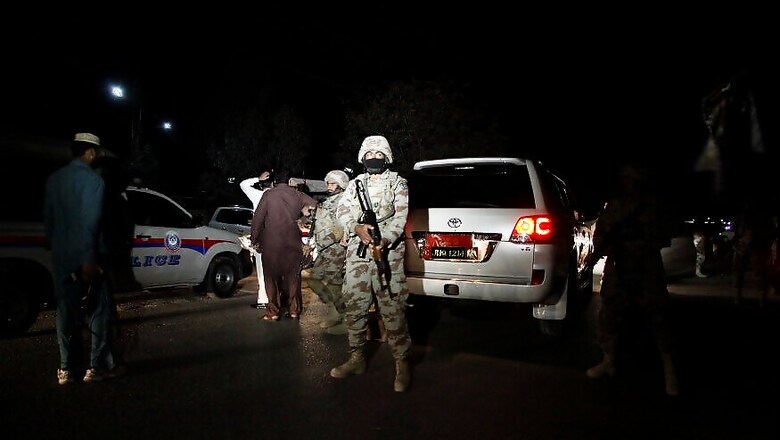
views
New Delhi: The three dead terrorists allegedly behind the attack on Pakistani police training academy in the southwestern city of Quetta that claimed 60 lives and left more than 100 injured were believed to be from the Al-Alimi faction of the Lashkar-e-Jhangvi militant group affiliated with the Pakistani Taliban, one of the top military commanders in Baluchistan, General Sher Afgun told media.
No group immediately claimed responsibility for the attack, but General Sher Afgum told media that calls intercepted between the attackers and their handlers suggested they were from the sectarian militant group, Lashkar-e-Jhangvi.
The Lashkar-e-Jhangvi (LJ), whose roots are in the heartland Punjab province, has a history of carrying out sectarian attacks in Baluchistan, particularly against the minority Hazara Shias. It was unclear what motive the group would have in attacking the police academy, a home ministry official said.
Brutal Militant group #ISIS Khurrassan claimed #Police Academy attack #Quetta #Baluchistan, saying 3 bombers of #IS carried out the attack? Saleem Mehsud (@SaleemMehsud) October 24, 2016
The ISIS Khorasan is a "branch" of the Islamic State that was set up last year inside Pakistan a few months after the Al Qaeda announced its wing for the Indian subcontinent. A BBC report from January 2015 says Khorasan is "a word that carried mythical overtones for some Muslims after an ancient prophecy that black flags would once again fly in Khorasan before the end of the world."
ISIS Khorasan operates in tandem with the Pakistani Taliban, which has been waging war against the Pakistani military. Thousands have been killed in the Zardb-Azb military operation launched by Pakistani Army under General Raheel Sharif to weed out Pakistani Taliban which the Army considers as "bad Taliban. Pakistan's state policy of classifying terror groups into "good" and "bad" as per their utility has been internationally criticized. Also read: Quetta Terror: How The Suicide Attack That Claimed Over 60 Lives Panned Out
Police, military and paramilitary personnel arrived at the training centre within 20 minutes of the attack and launched an operation which lasted for around five hours, the home ministry said.
Monday night's assault was the deadliest in Pakistan since a suicide bomber killed 70 people in an attack on mourners gathered at a hospital in Quetta in August.
The attack appeared well coordinated, with senior law enforcement agencies saying that assailants had fired at the police training centre from five different points.
Later, the attackers entered the centre's hostel where around 200 to 250 police recruits were resting, security officials said. At least three explosions were reported at the scene by local media.
Quetta has long been regarded as a base for the Afghan Taliban, whose leadership has regularly held meetings there in the past.
The Afghan Taliban's new leader Haibatullah Akhundzada openly taught and preached at a mosque outside Quetta for 15 years, until May this year. Akhundzada's predecessor Mullah Akhtar Mansour was killed by a U.S. drone strike while travelling to Quetta from the Pakistan-Iran border.
Baluchistan province is no stranger to violence, with separatist fighters launching regular attacks on security forces for nearly a decade and the military striking back. Militants, particularly sectarian groups, have also launched a campaign of suicide bombings and assassinations of minority Shias.
Also read: Quetta Terror Attack: Operation Ends; 3 Terrorists Killed, Over 60 Dead
(With agency inputs)




















Comments
0 comment